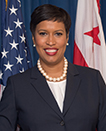Washington, DC
Mayor Bowser Releases District’s First-Ever Inclusive Innovation Report
(Washington, DC) – Today, Mayor Muriel Bowser and Deputy Mayor for Planning and Economic Development Brian Kenner released “Pathways to Inclusion,” the District’s first-ever report on the current state of inclusion in our tech, innovation, and entrepreneurship economy. The report highlights the barriers underrepresented communities face upon entering an industry vital to Washington, DC’s economic growth. In addition, “Pathways to Inclusion” sets bold goals to expand opportunities for District residents, including creating 5,000 new tech jobs for underrepresented workers and 500 new tech businesses founded by underrepresented entrepreneurs.
“The District of Columbia has the people, resources and public and private sector support to make the nation’s capital the top city for inclusion, tech and innovation,” said Mayor Bowser. “We look forward to becoming a national model for tech inclusion and entrepreneurship and proving that regardless of income or background, all residents have the opportunity to participate in our growing tech economy.”
While over half of DC’s workforce is made up of women, and over half of its workforce is made up of people of color, women make up just 37 percent of tech jobs and people of color only 28 percent. These percentages make Washington, DC more diverse than other cities, but the Bowser Administration strives to do better. Of African Americans with undergraduate degrees, 41 percent have a STEM (science, technology, engineering and math) degree; however, 70 percent of those residents are over 40 years old, as compared to 48 percent of Hispanics and 27 percent of Asians, indicating a need to get more African-American students prepared for STEM degrees.
Since taking office, Mayor Bowser has made inclusive innovation a focus of her efforts to diversify the District’s economy and create more pathways to the middle class.
In 2014, Mayor Bowser launched innoMAYtion, a month-long initiative showcasing DC’s innovation ecosystem and how local entrepreneurs are reshaping the District. Earlier this year, Mayor Bowser, in partnership with Howard University and Luma Lab, broke ground on the District’s first Inclusive Innovation Incubator, a new space that will support entrepreneurs and businesses that provide products and services to underserved communities. And, earlier this year, she launched Project 500, a partnership between American University’s new Center for Innovation in the Capital and the Office of the Deputy Mayor for Greater Economic Opportunity that will support five hundred disadvantaged small businesses in the District grow in revenue and size over the next three years.
Due to the District’s continued efforts, DC currently ranks as the top U.S. city for entrepreneurship growth and a top global city (seventh) for female entrepreneurs.
“The District is forging a new path toward an inclusive economy, one that supports our thriving tech ecosystem in a way that creates equitable opportunities for residents in all eight wards,” said Deputy Mayor Kenner. “We have made great progress, but there is still much work to do to ensure our tech, innovation, and entrepreneurship communities reach their full potential. Together, we will use ‘Pathways to Inclusion’ as a tool to help transform Washington, DC into a more inclusive, innovative, and equitable city.”
Working in collaboration with the DC Innovation & Technology Inclusion Council, the District devised a Technology Inclusion Scorecard to assess the level of tech inclusion in Washington, DC. Findings in four key functional areas – innovation infrastructure, education, employment, and entrepreneurship – show that entrepreneurship requires the most immediate attention and improvement. Within innovation infrastructure, investment in tech businesses when compared with other major U.S. cities, yields a low score. Education shows room for improvement in building a strong pipeline and ensuring that the gaps in test scores and achievement levels among diverse groups narrow. Finally, making STEM degree attainment more viable and catalyzing the growth of non‐bachelor tech occupations will be vital to increasing inclusion at the employment level.
“While this report is as important first step, there is much work to be done and we embrace the challenge with both realism and aspiration,” said Rey Ramsey, Chair, DC Innovation & Technology Inclusion Council. “Ultimately, this strategy provides an opportunity to give the District the assets it needs to achieve its vision. It also strikes an important balance between residents and infrastructure, highlighting the needs and potential of people, first and foremost.”
“Pathways to Inclusion” also identifies strategies for how the District will create the most inclusive culture among tech and innovation ecosystems on the East Coast. Recommendations include working with our tech community to create an inclusive incubator for entrepreneurs to launch and grow companies, encouraging local tech firms increase their participation in the Summer Youth Employment Program, and connecting diverse entrepreneurs to potential business opportunities.
The release of the report coincided with the launch of Beacon: The DC Women Founders Initiative, a campaign dedicated to making the District the top city in the country for women founders and entrepreneurs. Launched in partnership with Mayor Bowser, the Georgetown Institute for Technology Law and Policy, Google and other area thought leaders focused on innovation, the goals of the initiative are to provide dedicated grant funding to organizations that offer resources, mentoring and other support to women founders in the DC area.
For more information about the “Pathways to Inclusion” report, visit: dmped.dc.gov.

